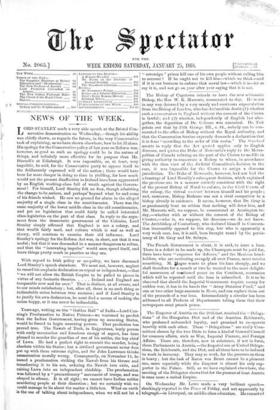The Bishop of Capetown intends to have the new schismatic
Bishop, the Rev. W. K. Macrorie, consecrated to-day. lie is not in any way deterred by a very manly and courteous expostulation from the Bishop of London, who has declared his doubt (1) whether such a consecration in England without the consent of the Crown is lawful ; and (2) whether, independently of English law alto- gether, the deposition of Dr. Coleus() was canonical. Dr. Tait points out that by 26th George ILL, c. 84., nobody can be con- secrated to the office of Bishop without the Royal authority, and that the Consecration Service expressly demands a declaration that it is done "according to the order of this realm." The Standard asserts in reply that the Act quoted applies only to English dioceses, and quotes the Duke of Newcastle's reply to the Metro- politan of Canada refusing on the part of the Crown to meddle in giving authority to consecrate a Bishop to whom, in accordance with the then view of the Judicial Committee's decision in the case, it vas impossible for the Crown to assign a diocesan jurisdiction. The Duke of Newcastle, however, had not had the advantage of Lord Romilly's subsequent decision, which explained the previous one in a manner entirely consistent with the right of the present Bishop of Natal to enforce, in the Civil Courts of the colony, the virtual contract between himself and his people ; and, moreover, Bishop Bethune was not a rival competitor to a bishop already in existence. It seems, however, that Dr. Gray is so passionately bent on schism that nothing will deter him, and Mr. Macrorie will, we suppose, be consecrated at Accrington to- day,—whether with or without the consent of the Bishop of Chester,—who is, we suppose, his diocesan—we do not know. The Archbishop of Canterbury, who declared himself in Convoca- tion irrevocably opposed to this step, but who is apparently a very weak man, has, it is said, been brought round by the persis- tency of Dr. Gray and Dr. Selwyn.






























